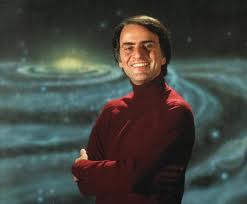Although the great man is no longer with us in real life, Carl Sagan's legacy of popular scientific interest was hugely influential during the latter years of the last century. He was a man of paradox. Openly critical of idea-based conjecture, he even attacked Pluto whom he considered to be 'artisan', yet in considering the moons of Saturn he was one of the first to suggest that Europa could possibly support life and that oceans may exist on Titan. His popularity was earned through publication of the book Cosmos and successful documentary of the same name, and the subsequent science fiction novel Contact which became an award-winning film.
Carl Sagan was a supporter of skepticism and wary of any bridge between science and art, but he was nevertheless ambivalent on the subject of faith. His beliefs seemed to extend to a reluctant acceptance that some form of creationist intellect was likely to exist. In terms of spiritual connections with scientific quest, he made his case clear, saying, "Science is not only compatible with spirituality; it is a profound source of spirituality. When we recognize our place in an immensity of light-years and in the passage of ages, when we grasp the intricacy, beauty, and subtlety of life, then that soaring feeling, that sense of elation and humility combined, is surely spiritual."
In the course of his notably public career Carl was influential in modernising the public perception of science and bringing the expansive universe to our attention. He worked with Stephen Hawking and Arthur C. Clarke, writing an introduction for A Brief History of Time, and advising on extraterrestial reference in the making of 2001- A Space Odyssey. Carl Sagan was extremely skeptical concerning the existence of UFOs, again illuminating the juxtapositions of this man of eternal paradox who brought the light of science to so many lives. He died in 1996, a year before his film Contact was released.

 RSS Feed
RSS Feed
